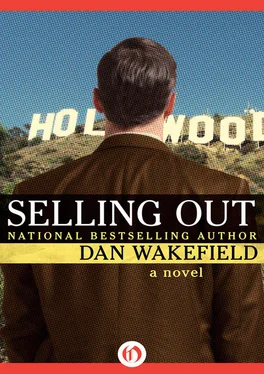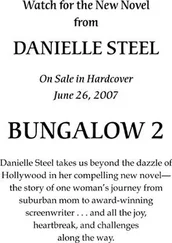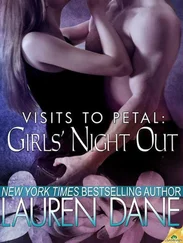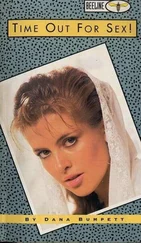At first Perry panicked because he couldn’t write stories any more. Then he realized he was simply in the wrong place. You wrote stories back East, where the sentences went all across the page. Perry was relieved. There was no sense in his trying to write prose on the Coast, where he’d come to write scripts. It was like trying to make himself ski on the desert or hike in the ocean. He stopped trying to do the impossible.
The problem was what to do with his time. The time in between the meetings. The meetings were the peaks of the day, and the rest of the time was like an empty bowl that had to be filled.
He tried to read books, but that was hard too. The look of a page of print seemed thick and crowded, like New York City, where everything was jammed together, buildings and people and cars. A printed page was like the East, the past. Out here in Los Angeles, in the future, everything was open, flowing, like the traffic on the freeways.
This was not a place of words but of pictures. Pictures had space in them, they were not filled with black lines and dots. They had color and motion. Yes, out here, the pictures moved. It was a place of moving pictures. Perry put aside books—they seemed heavy and opaque, like bricks—and filled his mind with pictures, moving pictures.
He went to movies and watched television. He watched everything—news and soaps and sitcoms and game shows. The only thing he didn’t like to watch was the morning talk shows. There were too many people on telling about their latest triumph—the hit movie or best-selling novel they had written or directed or starred in, the Meditation Cookbook that had just been sold to paperback for a million-five, the one-act play produced in a little theater in a small town in the Appalachians that was going to be produced as a feature film starring Jeremy Irons and Dolly Parton. He didn’t want to hear that stuff. Not now. Not till he had something going of his own, some slim thread that might lead to magnificence. Right now, he would even settle for sustenance.
The other thing he couldn’t stand to see on the morning talk shows was the national weather map. It reminded him where he was, down there at the left-hand corner, and seeing that, envisioning his position on the map, now gave him a sense of dizziness, of being off balance. He sensed some deep interior pull, almost like magnetism, that made him feel he ought to be in the upper right-hand corner of the national map, the little part like an ear sticking up that was actually New England. That was nonsense of course, it was some kind of childish response like he had about wanting the rain to turn to snow, just because that’s the way he had always known it, but he simply solved this daily disturbance by not turning on the TV until nine o’clock, when the game shows began. If he woke early and wanted to watch something, he either found old reruns on UHF, or played a tape of an old movie.
But after nine A.M. all television was good as far as Perry was concerned. It was moving pictures and gabble and applause and laugh tracks, and all that filled up his mind and stopped it from hurting. The problem was when the commercials came. Even though the commercials too had moving pictures, somehow they allowed other thoughts to creep in, let his mind slip off to regrets and mistakes and fears. He was trying hard not to do dope or drink during the day, so he had to find some way to plug up the leaks the commercials left in his mind.
The answer was games. The little electronic jobs you plugged in and held in your hands and played by pushing a button. Football and basketball and hockey. The games made little bleep-bleep sounds that helped fill his mind during the commercial breaks. He held the games while he watched the tube and was safely plugged in and tuned out.
Despite these ingenious efforts to relax, Perry couldn’t help noticing that his heart kept beating too fast. It wasn’t the coke, because he’d stopped doing it. He was only drinking wine and occasional brandies and smoking grass. The grass was supposed to calm him down. Still, he kept being aware of his heart pounding, as if it were trying to get his attention. He didn’t want to think about it, he figured it was part of his mental set, his anxiety, and if he just kept calm and cool it would slow down, just as he was trying to slow down.
But it didn’t.
He woke in the night with his heart pounding like a steam engine, as if he were a guy running the Boston Marathon and trying to make it up Heartbreak Hill. He was drenched in sweat.
He figured he’d better see a doctor. He didn’t want to ask Ronnie, because he would recommend a doctor in the Valley who catered to starving actors. If something was really wrong with him he wanted to see the best. He didn’t want to ask Ravenna, either. After being turned down by her dentist, he didn’t want to suffer the humiliating possibility of being rejected by her doctor as well. More important, he didn’t want her to suspect anything was wrong with his health.
Who wanted to represent an aging writer with bad teeth who had been fired off a feature and had some kind of problem with his heart?
He called the Vardemans. In a sense they were the last people in this town he wanted to see—for he didn’t want these powerful, successful friends to know of his overall plight—yet he knew they would be able to recommend a first-rate doctor. Even more importantly, perhaps, Perry had a deep longing, a crying need, to remind himself of his past, that he had a past, that he once was a bright, carefree, enthusiastic young grad student hanging out in Harvard Square. The Vees were at least a link to that time. Maybe he could get them to reminisce about the old days, not even talk about Hollywood at all except to recommend a good doctor.
Vaughan finally returned his call after three days, and sounded jovial enough till Perry said he wanted to get together for lunch and mentioned he was “staying” out in the Valley for a while. As much as he hated to admit it, Perry felt it was too degrading to actually lie and pretend he was living someplace where he wasn’t. Vaughan put him on hold while he discussed it with Pru. He said Pru couldn’t make it right now, she was really tied up, but Vaughan could meet Perry the next afternoon at three o’clock at the Bob’s Big Boy in Studio City.
Meeting at one of the chain of Bob’s Big Boy fast-food stops was even a cut below the hidden sushi bar in Playa del Rey, and three in the afternoon did not even come under the category of a late lunch, but Perry really had little choice. In fact he was grateful that Vaughan was making time to see him at all.
Vaughan had come from lunch with the new head of Unified, having struck a two-picture distribution deal with that studio for “multi buckos,” and evidently the new success had stoked his hunger, for he ordered a double cheeseburger with french fries and onion rings and a double thick chocolate malt. He explained the lunch he had just come from was primarily ritual, consisting of “sparrow food at some fancy fern joint,” and so he was glad to be able to chow down. Perry, watching his diet, had coffee and fruit cup, and started reminiscing about Mr. Bartley’s Burger Cottage back in Harvard Square.
Unfortunately, Vaughan didn’t seem in the mood for reminiscing about the good old days. Nor in fact did he ask Perry about what was going on with him now or what had brought him to be “staying” in the Valley. Once Vaughan finished his feast, he seemed nervous. Glancing at his watch, he said he had to be back at the fucking Polo Lounge for some shmoozing with a new young actress, a “hot little twat” from Argentina. On the way out, anyway, Perry got the name of his doctor, a “top internist” in Beverly Hills.
“Good man,” said Vaughan, “especially if you picked up any rash or running sore in the general area of the gonads. No embarrassment. Mucho discreet.”
Читать дальше












